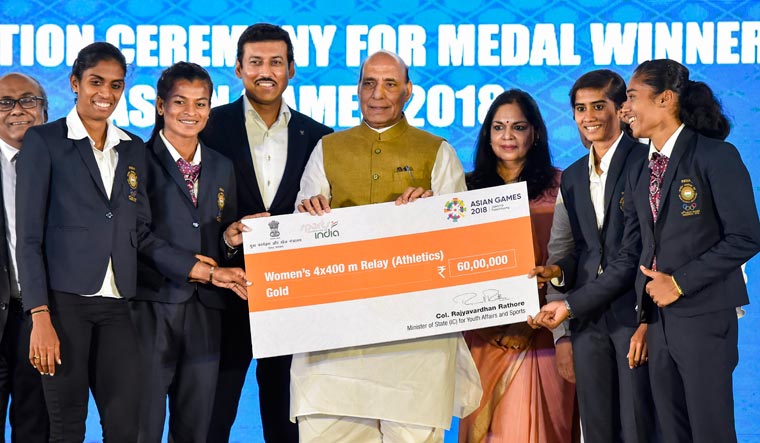Bahadur Singh, chief coach of the Indian athletics team, is a relaxed and proud man. The team returned home from the 18th Asian Games in Jakarta with its third best finish in its Asiad history. Arriving in the wee hours of the morning in New Delhi, the athletes met the media at the Delhi Lawn Tennis Association's residential wing on a rainy Tuesday morning.
Pointing at all the sprinters, Singh shared the secret of the team's success—most of them were young and had a never-say-die attitude and immense self-belief. “Our sprint team is born in 1993-94, with Poovamma being slightly older. These new kids are very strong. Some people love to fight, compete... these kids are in that category. Whatever may be going on around them, they will fight till the very end, once they stand on the line to race.”
also read
- Asian Para Games: Sumit Antil wins javelin gold, breaks own world record
- Indians sweep all medals in two events to begin Para Asian Games campaign in style
- 'Bridge is antithesis of gambling': Asian Games silver medallist Jaggy Shivdasani
- Asian Games hockey: Indian women beat defending champions Japan to win bronze
- Asian Games chess: India men and women settle for silver
The athletics team won 19 medals—seven gold, 10 silver and two bronze medals—which helped India finish with its best ever haul of 69 medals. India has now a bunch of young track and field stars, and not just javelin thrower Neeraj Chopra, to make India proud in international events.
He cited the example of shot-putter Tajinder Pal Singh Toor, 23, who won the shot put gold after 16 years, to explain how mentally strong the current crop of young Indian athletes are. “Look at Tajinder... his father was in hospital, he had to worry about everything back home and then to come in and throw his best in the first round itself—the way he was fighting was amazing.” Toor's joy at winning the gold was shortlived as he was informed of his father's death as soon as he landed in New Delhi.
Singh was effusive in his praise of the women's quartet of M.R. Poovamma, Saritaben Gaekwad, Hima Das and Vismaya V.K. who won the 4x400m relay gold and ensured India's supremacy at the continental games in the event. He declared that the current women's relay team was even better than their predecessors who were once ranked as high as seventh in the world. “This relay team is even better than the previous champion 4x400m relay team. Even in this competition, there was no competition for them. They were too good. I expect these girls to qualify early for Tokyo 2020. They are already in a very good position.”
In fact, Singh predicted the rise of another sprint sensation from among the present team members. “In a year or two, Vismaya will be as good as Hima. Keep an eye on her,” said the chief coach. Vismaya, who took India home in a composed manner, running the last leg of the relay, replaced the experienced Nirmala Sheoran in the team.
Hima, who also won a silver in the 400m, clocked under 51 seconds, becoming the first Indian athlete to do so. She has been improving with each big outing in the last year and a half. “Hima does not need to do anything other than what she is doing now, to hit the next level. She's improving in every competition. A few tweaks here or there—speed work, a wee bit of endurance—are all that is needed,” he said.
When asked about the pressure ahead of the 4x400m relay, Hima brushed it aside saying, “There was only a minor pressure. I did not want to let the team down. I was told by the AFI that I must do well in it. A player has to be mentally strong which I was. I had trained well in Finland and Czechoslovakia.” In fact, it was her burst of speed off the blocks that gave India the advantage in the relay.”
“As for the 200m event, I don't bother about anybody's reputation, and that helped. There was no pressure on me in the 200m race,” she said.
Another exceptionally tough athlete is heptathlon winner Swapna Barman. Born with six fingers on either feet that made it painful to compete in seven events in ill-fitting shoes, Swapna had to endure severe toothache to become the first Indian to win a gold in the event at the Asian Games. But pain and problems are not new to Barman, who hails from a poor family. Though she won the Asian Championships, getting a ticket to Asian Games was no mean task for Barman as she had to undergo four trials in four different events just before leaving for Jakarta.
“Despite everything, she won. She's a first-class fighter,” Singh said.
Barman was upset when people doubted her ability to do well at the Asian Games but she persisted with her training despite injuries. “I was worried about the injury. I had many injuries but I would practice with them. I had cried every day, every night when people thought I wouldn't be good enough at the Asian Games due to these injuries. But I carried on. Even at the Games, I told myself if one event didn't go well, then there are six others that can make up for it,” she said.
The toothache, mercifully, is gone and Barman is excited that a prominent shoe manufacturer has promised to develop a customised pair for her.



